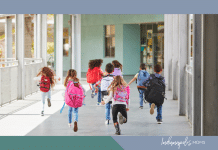We cannot create observers by saying ‘observe’, but by giving them the power and the means for this observation and these means are procured through education of the senses. ~ Maria Montessori
I stared to write a piece on Montessori education and the numerous components that have been studied over time, but the truth is, Montessori just felt like the right fit for us. We love our son’s Montessori school and I’m sharing my personal reasons why. Anyone can Google the benefits and the history, but from parent to parent, here are the reasons we chose a child-focused preschool (and likely Kindergarten on up).
We Parent Similar to Montessori If you could choose to have your young child dropped off into an environment that is similar to your parenting style, would you? Many people have tried to connect Montessori with Attachment Parenting, and while I do see the similarities, I’m not a full ‘Attachment Parenting’ parent. I do identify with the style more than others, but that’s just it, I don’t want strict boundaries that I can’t sway from when logic calls. Montessori is child-focused, meaning the boundaries are intact, certainly, but they aren’t that of a traditional didactic classroom (where the teacher and lesson plan are the focal point). Children are free to learn at their pace (this does NOT mean they can choose to not learn, as many assume). There aren’t ‘toys’ to play with instead, and the environment is so enriched with materials that children are innately curious about, their natural drive to learn kicks right in. Children are allowed basic rights, like the right to say ‘No thank you’ and ‘I’m done here, may I move to something else?’. We do practice this style of independence-driven parenting at home, and I appreciate these rights allotted to my son at school.
Multiage Environment Let’s face it, young children learn from other children. In the traditional Montessori classroom, there is a range of abilities and ages. Age is arbitrary outside of the obviousness of motor skill and developmental ability. The younger children learn from the older and the older children reinforce their skills by acting as peer facilitators to the younger. That’s win/win to me. Teaching my son to be respectful of children of many ages and abilities is an important factor in teaching him to be open minded and kind. How he treats his schoolmates is a direct reflection of his internal happiness. Because of the multiage environment, there is less altercation as seen in single-age classrooms. There is no tolerance for physical harm, bullying, or disrespect. As the mother of a single child, the multiage environment gives my son a chance to interact with older and younger children, as he would with siblings. It teaches him drive, patience, group skills, and personal boundaries.
First Impressions We all want to think of our children as brilliant little people (and in my opinion,they really are) but I had no idea what type of student my little genius would be until I dropped him off at school. Since he has to go to school for a very long time, it mattered to me that his first impression be a good one. I honestly was less concerned about him learning to write his name than I was about him enjoying the process of learning. Montessori schools are enjoyable. The students learn about world cultures, science, mathematics, and an array of critical thinking skills, all through work/play. It is truly incredible the way these classrooms excite the little ones to learn by doing. First impressions are a big deal to children. From sports to school to making friends, the better experience they have in the beginning, the better chance of success in the future. I tried to sign my son up for Tae Kwon Do when he was three and the instructor gave me amazing advice: Don’t. He is too young to enjoy it, which will likely turn him from it permanently. Each child is different of course, but he was spot on with mine.
Diversity Diversity matters a lot to my husband and me. We want our son to have access to world culture and language and art. I know he’s only four, but these are his formative years and the information going in does matter. Not only does he learn about recycling and the Chinese New Year, his classroom itself is diverse. Depending on where you live in the world, this isn’t always an opportunity. It’s a wonderful gift to be surrounded by many cultures and languages. The children we are raising now really are the future. Education is one of the only things in life that can’t be taken from a person. We chose to gift our son what we think to be the best opportunity for happiness, success, and kindness. These are the same values we honor as a family and our Montessori community is very much an extension of that.
Establishing lasting peace is the work of education; all politics can do is keep us out of war. ~ Maria Montessori








